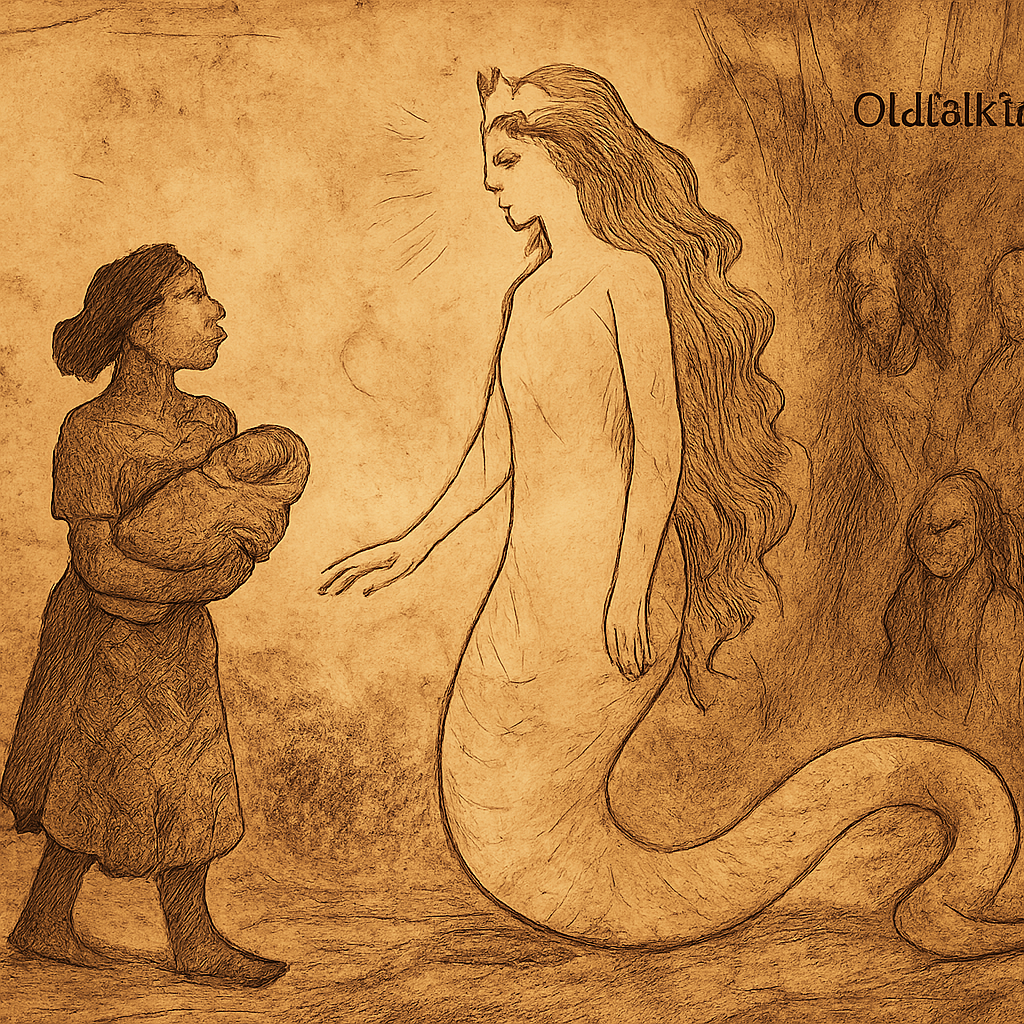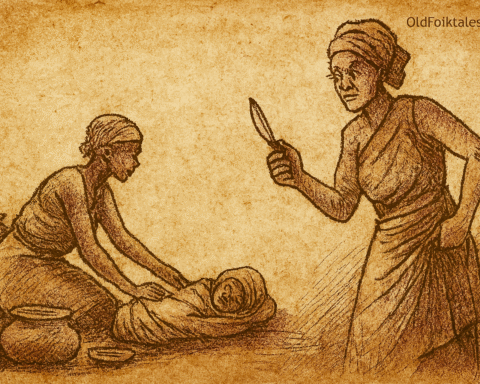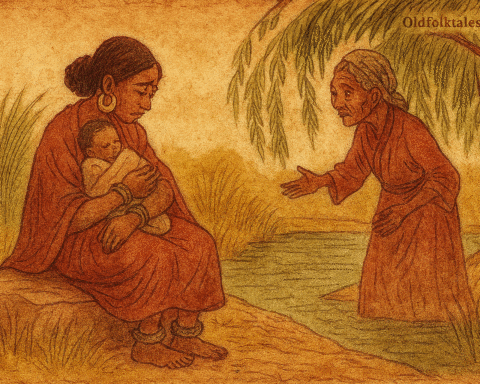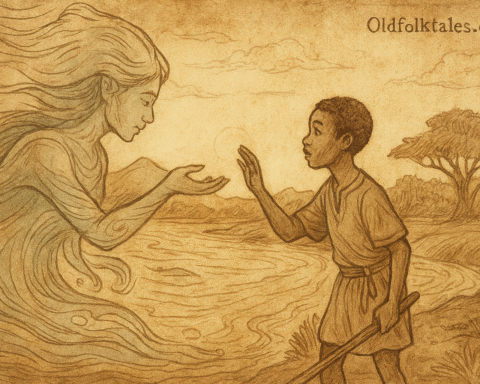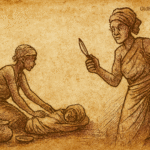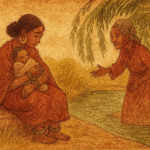In the old days, when the forests of Togo grew thick and wild and the rivers sang their ancient songs with voices like distant thunder, there lived a poor girl named Esinam. She walked through life as solitary as a single bird in an endless sky, with no brothers or sisters to share her joys and sorrows, no family to call her own. Yet despite her loneliness, she possessed a beauty that glowed like morning sunlight on water and a gentle spirit that drew kindness from even the hardest hearts.
One day, like a flower blooming in unexpected soil, love found her. She married into a wealthy household in the bustling town of Kpalimé, where the red earth roads wound between prosperous compounds and the air hummed with the sounds of commerce and celebration. At first, Esinam’s heart soared with hope that she had finally found the belonging she had always craved.
But her new in-laws’ hearts proved as cold as stones in winter. They treated her with sharp tongues and dismissive gestures, their voices cutting deeper than any blade. Day after day, they mocked her for having no relatives, their cruel words falling like bitter rain: “Who will stand for you when troubles come? Who will bless your child when the time arrives? You are nothing but a tree with no roots, a bird with no flock.”
Also read: The Fairy Hill Dancer
When the blessing of motherhood came to Esinam and her belly began to swell with new life, the women of the household buzzed with plans for the traditional celebration. In their culture, each expectant bride’s family was expected to arrive with generous gifts, aromatic foods prepared with love, and voices raised in joyful songs that would bless both mother and unborn child. The celebration was not merely festivity but sacred ceremony, a weaving together of family bonds that would cradle the coming child in community love.
Esinam’s heart grew heavy as lead when she thought of the approaching celebration. She wept bitter tears, for she had no kin to invite, no family to stand proud beside her, no voices to raise in blessing songs for her precious child.
One evening, as purple shadows stretched long across the land and the first stars began their nightly dance, Esinam walked to the river to fetch water for the household. The weight of her sorrow pressed down upon her shoulders like a heavy cloth, and she sat beside the flowing waters, letting her tears fall freely into the current that carried them toward the distant sea.
The river seemed to shimmer and dance in response to her weeping. Suddenly, from the rippling depths where moonlight painted silver paths across the water, a magnificent serpent rose like a vision from the realm of dreams. She was enormous and beautiful beyond mortal description, her scales gleaming like precious jewels, her head crowned with cowries and beads that caught the starlight and threw it back in rainbow patterns. This was Da-Nyigba, the Serpent Mother, ancient queen of the river spirits and guardian of all who called the waters home.
“Why do you cry, child of earth?” asked the Serpent Mother, her voice flowing like honey mixed with the music of running streams. “Why do your tears salt my waters with such deep sorrow?”
Esinam bowed low with the reverence due to such a powerful spirit, her forehead nearly touching the riverbank’s soft mud. Through her tears, she poured out her heart’s pain, the mockery of her in-laws, the approaching celebration where she would stand alone, the shame of having no family to claim her or bless her coming child.
The Serpent Mother listened with the patience of one who has witnessed countless human sorrows across the centuries. When Esinam finished her tale, the great serpent coiled around her with movements gentle as silk, her presence radiating warmth and ancient wisdom.
“From this day forward, lonely child, I am your mother,” Da-Nyigba declared, her words carrying the weight of sacred oath. “My children of scale and fin, of water and mist, are now your kin. You shall never stand alone again, for the river family has claimed you as our own.”
When the time of celebration finally arrived, Esinam’s in-laws gathered in the courtyard, their faces wearing expressions of cruel anticipation. They sharpened their tongues for fresh mockery, whispering among themselves: “Now we shall see her shame complete. Who will come for this rootless woman? Perhaps the shadows themselves will dance for her!”
But just as the ceremonial drums began their rhythmic beating, calling the spirits to witness the celebration, the very air in the courtyard began to shimmer like heat waves rising from sun-baked earth. A procession materialized as if stepping from another world entirely, figures emerging from what seemed like dancing light and flowing water.
The wedding guests gasped in wonder and fear as an extraordinary family entered the courtyard. Women glided forward clothed in fabric that shimmered like fish scales catching sunlight, their movements fluid as river currents. Men walked with dignity, carrying golden rattles that chimed with music sweeter than temple bells. Children danced between them, their skin shining like moonlight on calm waters, their laughter ringing like silver bells in mountain air.
At the head of this magnificent procession walked the Serpent Mother herself, transformed into human form but retaining her otherworldly majesty. She wore a crown of coral and shells that spoke of deep ocean mysteries, and her presence filled the courtyard with power that made the very walls seem to vibrate with ancient energy.
The spirit family brought gifts that exceeded the wildest dreams of mortal generosity. Baskets overflowed with foods that seemed to glow with their own inner light, gourds of palm wine that sparkled like liquid starlight, and treasures crafted with skill that no human hands could match. Each gift was more beautiful and valuable than anything the wealthy household had ever seen.
Esinam’s in-laws stood frozen in stunned silence, their mouths open like fish gasping for air, their cruel words dying unspoken on their tongues. They understood immediately that they stood before power far greater than their earthly wealth, witnessing magic older than their oldest stories. Never again would they dare to mock Esinam, for they had seen with their own eyes that her family was not only real but possessed strength and strangeness far beyond their comprehension.
From that transformative day forward, whenever cruelty raised its ugly head in Esinam’s direction, she was never alone. The Serpent Mother’s people stood behind her like an invisible wall of protection, their spiritual presence shielding her from harsh words and bitter treatment. They wrapped her unborn child in blessings woven from river mist and starlight, ensuring the baby would grow strong and wise under their otherworldly guardianship.
The spirit family gave Esinam something more precious than gold or jewels, they gave her honor, respect, and the unshakeable knowledge that she belonged somewhere in this vast world. They reminded all who witnessed their power that family bonds are not limited to blood and birth, but can be forged from love, loyalty, and the mysterious connections that tie kindred spirits together across the boundaries between worlds.
Esinam’s child grew up blessed beyond measure, protected by both earthly love and spirit magic, surrounded by a family that spanned the realms of water and land, mortal and divine. The household that had once scorned a poor, lonely girl now treated her with the reverence due to one claimed by the ancient powers themselves.
And so the elders of Togo still say to this day, their voices carrying the wisdom of generations: “When the river claims you, you are never alone.”
Moral Lesson
This powerful Togolese folktale teaches us that true family extends beyond blood relations and that genuine belonging can be found in the most unexpected places. Esinam’s story reveals how kindness and spiritual connection can create bonds stronger than traditional kinship, and how those who show respect to the natural world and its spirits may find themselves protected by forces beyond human understanding. Most importantly, it demonstrates that no one is truly alone when they open their hearts to the possibility of spiritual kinship and chosen family.
Knowledge Check
Q1: What role does Da-Nyigba, the Serpent Mother, play in this Togolese folktale? A1: Da-Nyigba serves as the divine protector who adopts lonely Esinam as her spiritual daughter, providing her with a powerful river spirit family that shields her from her in-laws’ cruelty and gives her the honor and belonging she desperately needed.
Q2: How does the cultural context of pregnancy celebrations highlight Esinam’s isolation? A2: In Togolese tradition, expectant mothers’ families were expected to bring gifts, food, and songs to bless the coming child. Esinam’s lack of biological family made her isolation painfully visible during this important cultural ceremony, emphasizing her desperate need for kinship.
Q3: What symbolic significance does the river setting hold in this West African tale? A3: The river represents a liminal space between the mortal and spirit worlds, where transformation and divine intervention can occur. It symbolizes the flowing, adaptive nature of family bonds that can transcend traditional boundaries between human and spirit realms.
Q4: How do the spirit family’s gifts demonstrate their supernatural power to Esinam’s in-laws? A4: The spirit family brings treasures “finer than any seen before” foods that glow with inner light, wine that sparkles like starlight, and crafted goods beyond human skill. These otherworldly gifts prove their divine nature and superior power to the wealthy but merely mortal household.
Q5: What does the transformation in how Esinam’s in-laws treat her reveal about respect and power dynamics? A5: The in-laws’ immediate change from mockery to respectful silence shows how witnessing Esinam’s powerful spirit family forces them to recognize her true worth and status. Their fear of the supernatural family’s power teaches them to respect what they had previously scorned.
Q6: What broader cultural message does this Togolese folktale convey about spiritual kinship? A6: The story reflects West African beliefs about the interconnectedness of human and spirit worlds, teaching that spiritual adoption and chosen family bonds can be as meaningful and protective as biological relationships, especially when formed through mutual respect and genuine need.
Source: Togolese folktale
